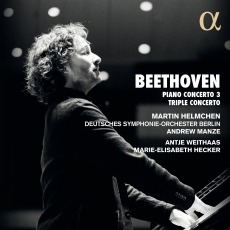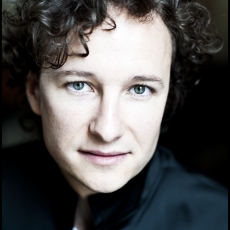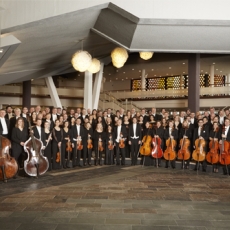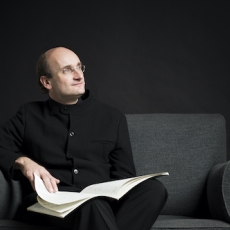Martin Helmchen, Andrew Manze & DSO Berlin - Beethoven: Piano Concerto 3 - Triple Concerto - Fanfare
One might have expected the celebratory Beethoven year to be met with a flood of recordings of his nine symphonies, since they remain the most popular works with a wide audience. But even on an assiduous listening schedule I didn’t find a new cycle of the symphonies that matched the excellence that several pianists showed in the five piano concertos. The top tier was occupied by two highly regarded Germans, Lars Vogt and Martin Helmchen, with two other cycles, by Jean-Efflam Bavouzet and Jan Lisiecki, having some high points but suffering somewhat from inconsistency. Listening to the third and final installment of Helmchen’s cycle, which I have praised every step of the way, I’d say that he deserves first place.
Vogt was up to the task of conducting from the keyboard, leading the Royal Northern Sinfonia in England, of which he is music director. The absence of a separate conductor might be overlooked in the two early concertos, but Andrew Manze confirms my bias for a conductor as necessary in the mature concertos from No. 3 onward. In fact, he and Helmchen are outstanding in No. 3, which becomes one of the highlights of their cycle. Conductor and pianist seem to thrive on traditional, heroic Beethoven without stodginess or apology. Energy and exuberance are in abundant supply.
There are famous pianists who were fully engaged and alive in these concertos (Schnabel, Serkin, Kempff) and others who weren’t at their best (Pollini, Gilels, Kissin), for reasons I can’t fathom. The works can feel overly familiar at times, and then I turn to a true original like Mikhail Pletnev, whose one-of-a-kind cycle on DG I nominated, with warning flags for the unadventurous, for the Classical Hall of Fame. Helmchen isn’t an original like Pletnev, but he is just as convinced that the C-Minor Concerto, finished in 1803, the same year the “Eroica” was begun, belongs beside the “Emperor” Concerto rather than beside the two early ones. Period performance devotees should probably stay away, but if like me you admire this concerto as recorded by Serkin with Leonard Bernstein and the New York Philharmonic (Sony), here is a close match.
I was uncertain at first, however, because Manze plays the long orchestral introduction rather tamely, adding pauses and diminuendos for nuance, both unnecessary and in this case misleading, because the minute Helmchen enters, he’s the driving force behind the performance, displaying the exciting volatility that marked Serkin’s Beethoven, especially early on in his career—the first- movement cadenza virtually explodes.
The heightened energy level continues into the slow movement, where Helmchen takes full advantage of the extensive embellishments and flourishes that tend to go unnoticed in more polite readings. The first statement of the main theme in the Largo is sensitively done, but later on the focus is more on pianism than on spinning a hypnotic lyrical line. Helmchen’s urgency is reflected in a timing of 8 minutes for this movement, whereas Serkin-Bernstein take 11 minutes (on the other hand, their pace in the first movement is faster and more exciting). It’s a tribute to Helmchen that he plays the finale up to Serkin’s standard, both musical and technical, using exactly the same tempo.
The Triple Concerto would have fared better if the violinist, Anje Weithaas, and the cellist, Marie-Elisabeth Hecker (Helmchen’s wife and frequent musical partner) felt the same exuberance as he does. But the three tend to play inside their own stylistic comfort zones. Weithaas is often inclined to echo Helmchen’s galvanizing energy, but she never seems to grab the limelight, and Hecker, who makes some ugly sawing sounds in the lower register, resolutely refuses to get excited. The performance as a whole is respectably above average, but this year brought a brilliant star turn from Anne-Sophie Mutter and Yo-Yo Ma under Daniel Barenboim, who conducted from the piano (DG). It makes this new account of little account.
I can’t quite rank Manze as high as Bernstein (no surprise), and we get some raw playing from the trumpets in the Deutsches Symphonie-Orchester Berlin, along with a string section that sounds ordinary next to the New York Philharmonic. Nor, surprisingly, is the recorded sound equal to the old Sony. For all that, if Helmchen’s cycle appears in a bargain box set, or if you buy the first two installments and download the Third Piano Concerto, it’s an acquisition that gives you the best of the year in this genre.



